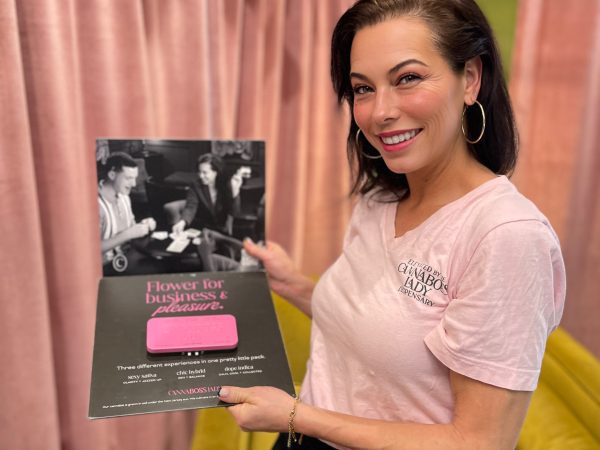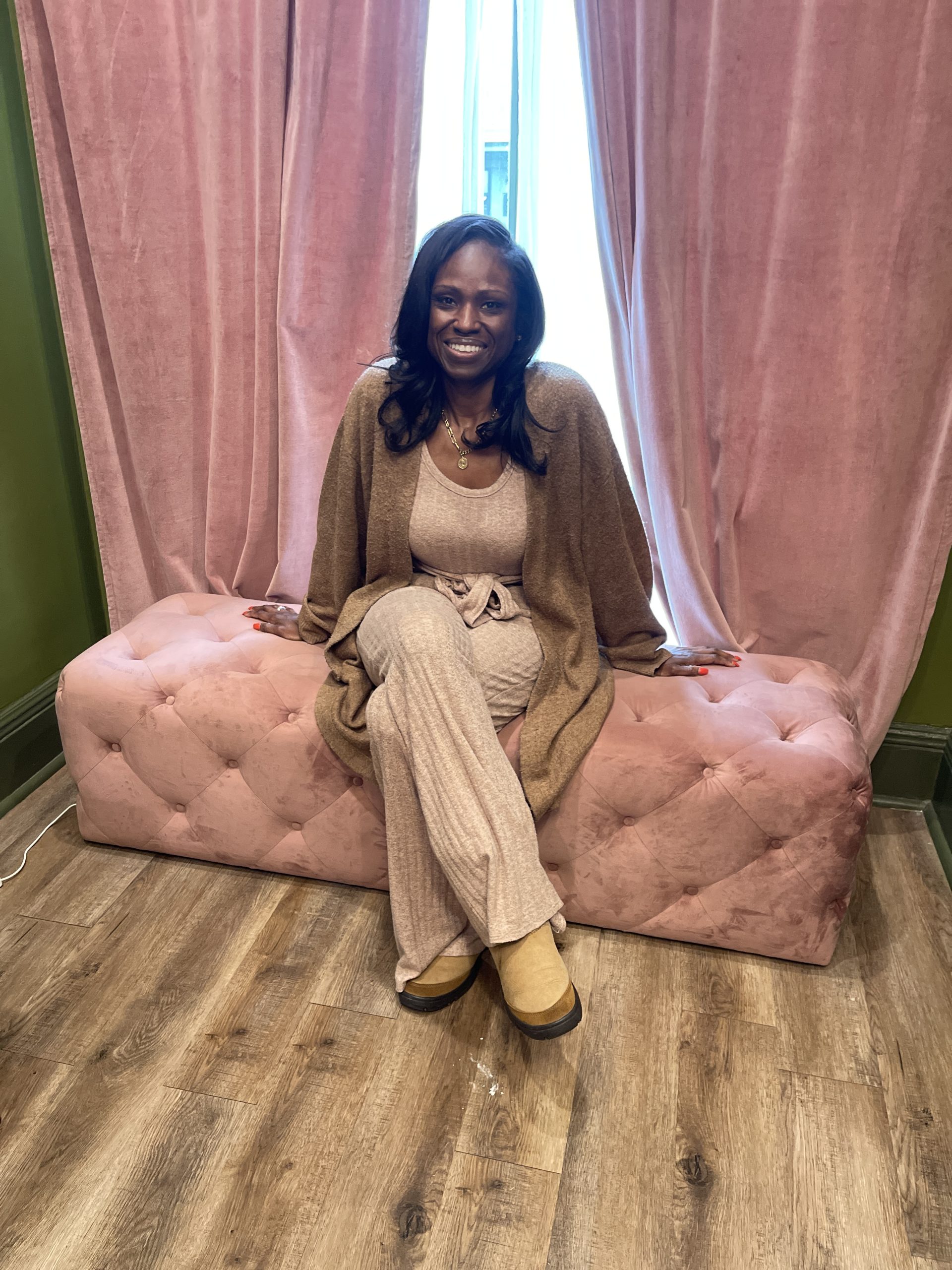Jill Cohen and Wadeeha Jackson are pioneers.
Not only have they each started their own businesses, they have started businesses in cannabis, blazing a trail in a highly regulated but new and relatively uncharted world — and, in the process, shaping that world for other entrepreneurs, many of whom are also starting their own women- and/or Black-owned operations.
Partnering with fellow female entrepreneurs is a priority for Cohen, who founded CannaBossLady Boutique in Maplewood Village in February 2021 as a women-owned CBD shop, and expanded in 2023 with Elevated by The CannaBoss Lady Dispensary. She’s now branching out further with her own line of Sexy, Chic & Dope Preroll variety packs — which will be delivered by Jackson’s Directleaf service to customers’ doors within a 10-mile radius of the dispensary.

Jill Cohen and Wadeeha Jackson
“I’m the first independently woman-owned cannabis dispensary owner to release a branded preroll variety pack!” said Cohen.
And Cohen is excited to have Directleaf delivering.
“Wadeeha was one of my first customers and we started to get to know each other and then, I think maybe after a year, she said, ‘I’m kind of thinking about getting in the cannabis business. Would you counsel me? Would you mentor me?’ And I said, ‘Absolutely!'”
Cohen then introduced Jackson to all her “people” — consultants and a lawyer to “guide her through the whole journey of it.”
With Cohen’s aid and her own expertise coming from an extensive banking and financial compliance career, Jackson became the first Black woman to obtain a delivery license in the state.
With cannabis delivery, not just anybody can deliver. The business is, again, highly regulated with protective measures in place: all drivers are fingerprinted, go through background checks, and receive badges. Special lock boxes are needed in cars, and the system is digital pay only through ACH transactions.
“Being the first, for this particular license class, there’s no blueprint,” said Jackson. “New Jersey selected the Class 6 Courier license, and no other state has that particular model.” She noted that she can partner with dispensaries but she cannot have inventory. “If something gets returned, I can’t inventory it, I have to bring it back. Other states don’t have that.”
Throughout the process, Jackson has been working closely with the NJ Cannabis Regulatory Commission, or CRC. “I brought my concerns with the regulation related to delivery in relationship with the dispensaries, and I identified some gaps,” said Jackson. “It’s understandable because no other state had that model. So I’ve been in very close communication with the state and even giving feedback as to what best practices are, what they should hold the dispensaries accountable for, etc.”
Directleaf began operations in December 2024 and already has five employees, including drivers and dispatch.
A personal connection to cannabis
Both Jackson and Cohen have very personal reasons for being drawn to the cannabis business.
“Unfortunately I had an abusive childhood that gave me extreme anxiety. And that extreme anxiety led to debilitating stomach aches,” said Cohen. Doctors and hospital visits yielded no answers and frustrations with not having her chronic anxiety diagnosed or treated. Then at age 18, at a party, she tried some “Mary Jane, marijuana, ganja.”

Jill Cohen showcasing the first variety pack preroll brand to launch in New Jersey—featuring Sexy Sativa, Dope Indica, and Chic Hybrid.
“I don’t care what you call it,” Cohen remembers telling her eventual friend and dealer. “I just need more of it!”
“It saved my life,” Cohen said.
After years of working in PR and events marketing and ultimately advertising, Cohen became an advocate for the legalization of cannabis and ensuring that social equity was a part of the deal.
“The street dealers created this industry and they should have a say in how it operates because they also were the smartest, they had the knowledge on how much it costs to make, how much you should sell it for, how you transport it — they knew all that.”
They also had paid the legal price for selling an illegal drug.
Jackson says that’s where her story intersects.
Despite growing up middle class in Union with a mom who worked on Wall Street in the go-go ’80s, her family was impacted by the war on drugs when her father served time for dealing and her mother fought addiction.
“My background from a social equity perspective is also because I come from a family that was impacted,” said Jackson. “I have an onus to the community that you can take cannabis-related businesses and it can serve a purpose.” [Jackson has given back in other ways including as a Court Appointed Special Advocate for children in foster care.]

Wadeeha Jackson
As a child who grew up in an environment with both “heavy” drugs and cannabis, she recognized the difference. Jackson said she saw that cannabis had medicinal benefits, whereas other substances were detrimental.
“I think it gives you a different mindset of how to do it responsibly because you see the positive and the negative,” said Jackson.
On the business end, her journey started back in 2017. “As a bank auditor, I always had to go into the branches and do an audit. One of my branches was in Connecticut when they first started seeing medicinal dispensaries come to market.”
“When I got into consulting after I left being an auditor for a particular bank, I had one bank that asked if I could develop cannabis-related procedures for us to safely onboard cannabis related businesses,” said Jackson. “That was at that point when there was federal guidance from FinCEN” — the Financial Crimes Enforcement Network, a bureau within the United States Department of the Treasury.
Both women have navigated labyrinths of regulations and expended a lot of financial resources to get their businesses up and running, but they say it is worth it.
Cohen says that the SOMA community has embraced all the new cannabis businesses and that the township has been extremely helpful. She singled out Maplewood Mayor Nancy Adams: “I love Mayor Adams!” The women note that the 2% municipal tax on cannabis items is providing direct relief for local taxpayers.
Beyond that, Cohen and Jackson say the girl boss network they have created is paying dividends personally and professionally.
“I love the women in this industry because we can all confide in each other,” said Cohen. “We can talk about what’s going on, and then share, ‘I’m dealing with that too.’ And then it’s so nice to know somebody else is with you.”
Learn more at TheCannaBossLady.com and Directleaf.co.

